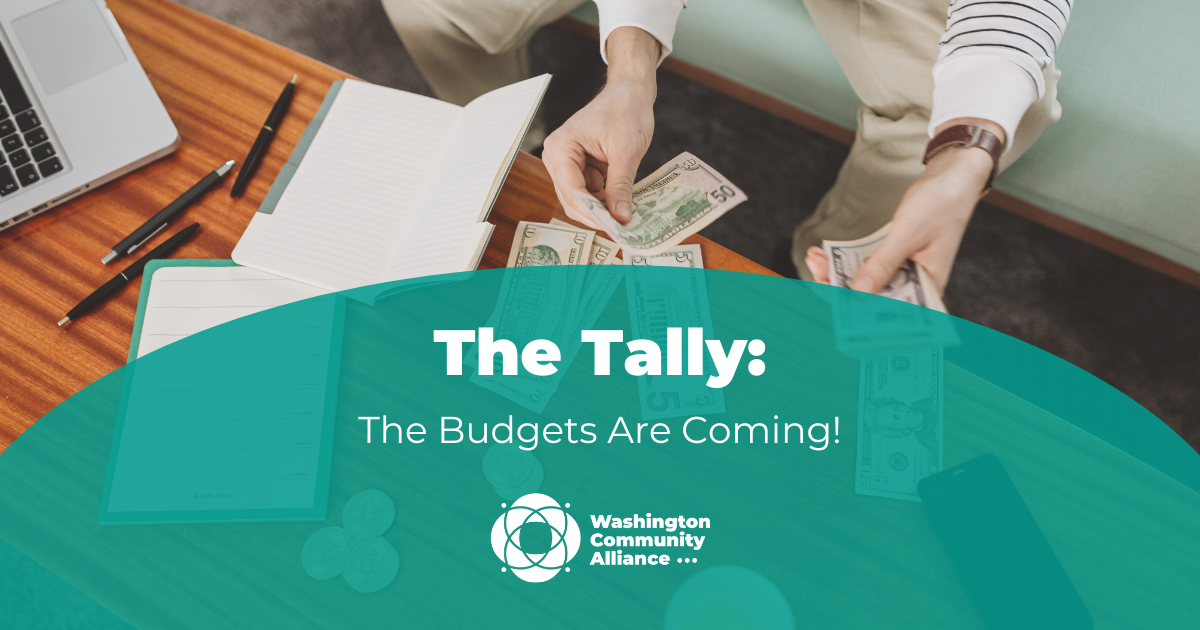
Darlings–
The sun is shining. Birds are chirping. Our seeds are in the ground, and the legislature is laying the seeds for the next couple years of spending in the budget. Because it’s a long session, the legislature will set the budget for the coming two years. Unlike our spring weather forecast, the revenue forecast that just dropped is looking a bit grim. What does that mean for our communities? Read below.
🐷💰 The Budgets are Coming 🐷💰
It’s that time of session—Senate and House budgets will be released in the coming days. The budget process is deeply flawed. It’s wonky, confusing, and discourages public participation and accountability. Last year, legislators released the budgets—read: thousands of pages of spreadsheets—the same day of public comment. This year, it’s much the same. That’s not a recipe for everyday folks weighing in on what matters most to them. But budgets are moral documents. It matters what they pay for and on whose backs we balance them. So today we’re doing a budget deep dive because this wonky process has huge impacts on people’s lives.
In Washington, we make our budgets on two year cycles. This is a long legislative session (as are all odd years) which means that this year the legislature will put forward the biennial budget that covers July 1 2023- June 30 2025. During short legislative sessions (even years), the legislature can make adjustments to the biennial budget with a supplemental budget. The budget legislators build in the coming weeks will shape much of the next two years for Washington communities.
There are three budgets at the legislature:
- 🚌 The transportation budget pays for highways, ferries, enforcing the traffic laws
- 🏛️ The capital budget pays for things like state buildings, public schools, higher education facilities, prisons, public lands, parks
- 🎒 The operating budget pays the day-to-day bills for the things people in Washington need– think schools, state programs and many of our top six bills
There are two key types of spending that appear in the budget.
- Fiscal Notes: You’ve heard us talk about these. These are the price tags for bills– the cost of implementing a policy. If a bill passes the legislature, the amount in the fiscal note has to be incorporated into the budget so there’s a plan to pay for it.
- Budget Provisos: A budget proviso is a line item in the budget to fund your project or program without passing a bill to make it happen. Legislators can submit proviso requests to budget writers in order to get the things they want to see funded.
The process for developing the budget starts in the fall and ends on July 1st when the budget goes into effect:
- Early Fall: State Agencies submit their budgets to OFM (the Office of Financial Management) – this begins the process of figuring out which programs need funding in the state
- Mid-November: The revenue forecast comes out – this tells us a little bit about how much money will be available for the budget, more on this below
- Mid-December: The Governor’s Budget gets released – this highlights the Governor’s priorities and helps set the tone. Items that show up in the Governor’s budget have a better chance of moving forward
- January: Legislative session begins and legislators hold public hearings on the Governor’s budget
- Mid-March: Another revenue forecast comes out– the forecast for March 2023 just dropped
- Late March/Early April: House and Senate release their budgets and revenue proposals
- April: Session ends
- May: Governor takes action on the budget and revenue proposals passed by the legislature
- July 1: State budget goes into effect
The main people who have power over the budget process are folks you’ve heard a lot about from us: House Appropriations Chair Timm Ormsby (D-3), Senate Ways & Means Chair Christine Rolfes (D-23) and Governor Jay Inslee. The Chairs have power because they write the budget in their respective chambers. The Governor submits a proposed budget at the start of session and then has veto power over the final product at the end of session.
Okay. You still with us? That’s the breakdown of how the budget works. Let’s talk about the vibes this year.
First- what’s the revenue forecast and what does it mean? The revenue forecast estimates the general fund revenue for the biennia– it’s a guess at how much money we’re going to have for the next couple of years. The forecast is released four times a year by the Economic and Revenue Forecast Council and is an important part of how legislators think about the budget. If the forecast is low and there isn’t enough money, the state might need to cut spending. If the forecast is high and there’s extra money, the state can spend it, put it in reserves or cut taxes to bring in less revenue. The forecast is a data based vibe check for the leg– do they need to cut spending? Raise more revenue? How much trouble are they in this year when it comes to paying for the things folks need?
Back in November of 2022, two important things happened. First, the election went better than expected. There was no red wave; in fact, Democrats strengthened their majorities. Second, the revenue forecast was sunnier than expected. Everyone relaxed a little. Unfortunately, lots of folks also decided this meant we didn’t need to prioritize passing progressive revenue like a wealth tax or an estate tax this year. The vibes were good, the money seemed to be flowing. When the revenue forecast looks good, it makes it easier to ignore that Washington has the single most broken and regressive tax code in the entire country. Our tax code is always an emergency but legislators have been dragging their feet for decades on doing the real work of fixing it.
The recent revenue forecast from March shows a change in the weather. The economy is going to slow down. We’re going to bring in less money from real estate taxes and other sources than expected. The budget writers will adjust their budgets accordingly. The danger is that legislators will decide this means we simply can’t pay for the things we care about. Too many good bills have already died because we decided we couldn’t pay for them.
Instead, legislators should take this recent forecast and decide that now is the time to pass progressive revenue and ensure every Washingtonian has a great place to send their kids to school (where they get fed free meals), a house to come home to at the end of the day and a way to get to that house that doesn’t destroy our fragile climate. We can fund these important things but we need the political will to do it.
The capital budget dropped this week in the Senate and the operating budget is expected today. The House versions should follow next week.
What do you think? Have any questions? Tweet us your thoughts @WACommAlliance.
Keep up on the action and opportunities to get involved through our legislative newsletter, The Tally.

